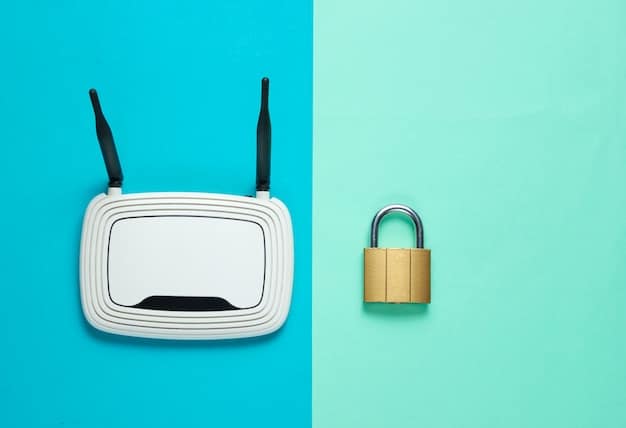Streaming Security: How to Protect Your Privacy Online

Streaming security involves implementing various measures like using strong passwords, VPNs, and being cautious of phishing attempts to protect your personal data while enjoying online content.
In today’s digital age, streaming services have become a ubiquitous source of entertainment and information. However, the convenience of streaming comes with potential security risks. Understanding and implementing **streaming security** measures is crucial to protect your privacy and personal information while enjoying your favorite shows and movies.
Understanding the Risks of Streaming
Streaming services collect a significant amount of data about your viewing habits, preferences, and personal information. This data can be vulnerable to breaches, leaks, and unauthorized access. Understanding these risks is the first step in securing your streaming experience.
Data Collection by Streaming Services
Streaming platforms track what you watch, when you watch it, and even the devices you use. This data is used for targeted advertising, personalized recommendations, and service improvement. However, it can also be a goldmine for cybercriminals.
Potential Security Threats
From phishing attacks to account hijacking, several security threats can compromise your streaming security. Weak passwords, unsecured networks, and malware can all lead to breaches of your personal information.
- Phishing Attacks: Cybercriminals often use deceptive emails or messages to trick users into revealing their login credentials.
- Account Hijacking: If your username and password are compromised, hackers can take over your streaming accounts.
- Malware: Downloading unofficial streaming apps or clicking on suspicious links can expose your devices to malware and viruses.
By recognizing these risks, you can take proactive steps to protect yourself and your data.

Essential Security Measures for Streaming
Implementing essential security measures can significantly reduce your risk while streaming. These measures include using strong passwords, enabling two-factor authentication, and utilizing VPNs.
Strong Passwords and Two-Factor Authentication
Creating strong, unique passwords for each streaming account is crucial. Additionally, enabling two-factor authentication adds an extra layer of security by requiring a second verification method, such as a code sent to your phone.
Using a Virtual Private Network (VPN)
A VPN encrypts your internet traffic and masks your IP address, making it harder for hackers to track your online activity. This is especially important when streaming on public Wi-Fi networks.
- Encryption: A VPN encrypts your data, making it unreadable to cybercriminals.
- IP Masking: By masking your IP address, a VPN hides your location and identity.
- Bypassing Geo-Restrictions: VPNs can also allow you to access content that is restricted in your region.
These measures can drastically improve your streaming security, safeguarding your personal data from potential threats.
Securing Your Home Network
Your home network is the gateway to all your online activities, including streaming. Securing your home network is essential to protect your streaming data from unauthorized access.
Updating Your Router’s Firmware
Regularly updating your router’s firmware can patch security vulnerabilities and improve its overall performance. Check your router manufacturer’s website for the latest updates.
Creating a Strong Wi-Fi Password
Using a strong password for your Wi-Fi network prevents unauthorized access to your network and the devices connected to it. Use a combination of uppercase and lowercase letters, numbers, and symbols.

Enabling Firewall Protection
A firewall acts as a barrier between your network and the internet, blocking unauthorized access and malicious traffic. Ensure that your router’s firewall is enabled and properly configured.
- Network Monitoring: Firewalls monitor network traffic for suspicious activity.
- Access Control: Firewalls control which devices and applications can access your network.
- Protection Against Intrusions: Firewalls block attempts to intrude into your network.
By taking these steps, you can create a secure home network that protects your streaming activities.
Privacy Settings and Streaming Services
Most streaming services offer privacy settings that allow you to control the amount of data they collect about you. Configuring these settings can help you maintain your privacy while enjoying streaming content.
Reviewing Privacy Policies
Read the privacy policies of the streaming services you use to understand what data they collect, how they use it, and with whom they share it. Be aware of your rights and options regarding your data.
Adjusting Data Collection Settings
Many streaming services allow you to opt out of certain data collection practices, such as targeted advertising or personalized recommendations. Adjust these settings to limit the amount of data collected about you.
- Limiting Ad Tracking: Opt out of personalized ads to reduce the amount of data used for targeted advertising.
- Controlling Recommendations: Adjust your settings to limit the personalization of recommendations.
- Managing Shared Data: Understand and manage how your data is shared with third parties.
Taking control of your privacy settings can help you minimize the amount of personal information collected by streaming services.
Staying Vigilant Against Phishing and Scams
Phishing and scam attempts are common tactics used by cybercriminals to steal your login credentials and personal information. Staying vigilant and recognizing these threats is crucial for streaming security.
Recognizing Phishing Emails
Phishing emails often contain suspicious links, urgent requests, or grammatical errors. Be wary of any email that asks you to provide your login credentials or personal information.
Avoiding Suspicious Links
Never click on links from unknown or untrusted sources. Always verify the legitimacy of a website before entering your login credentials or personal information.
- Checking Sender Address: Verify that the sender’s email address matches the official domain of the streaming service.
- Hovering Over Links: Hover over links to see where they lead before clicking on them.
- Avoiding Generic Greetings: Be wary of emails that use generic greetings like “Dear Customer.”
By staying vigilant and cautious, you can avoid falling victim to phishing and scam attempts.
Legal Streaming vs. Piracy
Choosing legal streaming services over pirated content is an important aspect of streaming security. Pirated content often contains malware and exposes you to legal risks.
Risks of Pirated Content
Downloading or streaming content from illegal sources can expose your devices to malware, viruses, and other security threats. Pirated content is often distributed through unsecured channels, making it a breeding ground for cybercriminals.
Benefits of Legal Streaming Services
Legal streaming services offer a safe and secure way to enjoy your favorite content. They invest in security measures to protect your personal information and prevent malware infections.
- Security: Legal streaming services employ robust security measures to protect your data.
- Legal Compliance: By using legal streaming services, you avoid the legal risks associated with piracy.
- Quality: Legal streaming services offer high-quality content without the risk of malware infections.
Opting for legal streaming services is a responsible choice that protects your security and supports content creators.
| Key Point | Brief Description |
|---|---|
| 🔒 Secure Passwords | Use strong, unique passwords for each account. |
| 🛡️ Use a VPN | Encrypt your traffic and mask your IP address. |
| ⚠️ Avoid Phishing | Stay vigilant against suspicious emails and links. |
| 📡 Secure Network | Keep your home network updated and secure. |
Frequently Asked Questions
▼
Streaming security is crucial because streaming services collect a lot of personal data which, if compromised, can lead to identity theft. Protecting your data ensures a safer online experience.
▼
A VPN encrypts your internet traffic and hides your IP address, making it difficult for anyone to track your streaming activity. This adds a layer of privacy and security.
▼
Phishing emails often have poor grammar, urgent requests, and suspicious links. Always verify the sender’s address and avoid clicking on links from unknown sources.
▼
Use a combination of uppercase and lowercase letters, numbers, and symbols. Avoid using easily guessable information like your name or birthday. A password manager can help.
▼
Streaming on public Wi-Fi can be risky because these networks are often unsecured. Using a VPN is highly recommended to protect your data on public Wi-Fi networks.
Conclusion
Protecting your privacy while streaming online is essential in today’s digital landscape. By implementing strong security measures, staying vigilant against threats, and making informed choices about streaming services, you can enjoy your favorite content with peace of mind.





